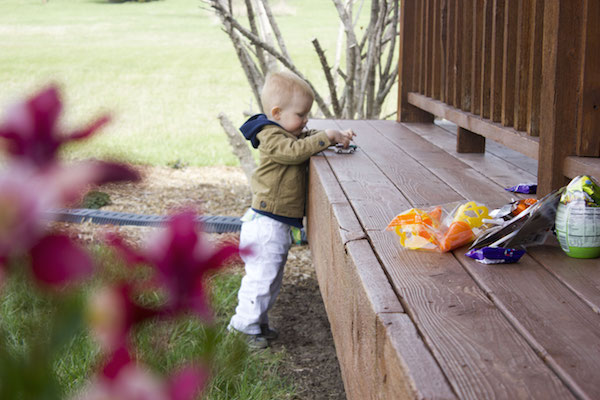I’m far from a perfect parent. But the days I get it right, I owe a lot to RIE. RIE (Resources for Infant Educarers, pronounced “wry”) receives plenty of attention for discouraging sippy cups, jumperoos, and high chairs, all of which I use in spades. Maybe with more experience, I’d be able to avoid those contraptions, but for now, I pick and choose from the RIE menu to suit my needs and abilities.
RIE was founded by Magda Gerber in the 1940s and is currently popular among LA celebrities. I received my RIE education primarily from Janet Lansbury’s blog and books (yes, she’s related to Angela Lansbury). I can comfortably say that RIE has revolutionized the way I parent and is a major reason I’m excited to get up and be a mom each day. I must admit I feel vulnerable sharing these ideas, as some are controversial, and I usually hide from conflict like a burrowing mole. But, if sharing what works for me helps one mom gain confidence, it’s worth the risk of criticism.
Treat Your Baby Like a Whole Person
Speak to your child as if she’s a whole person, because, after all, she is. When your baby resists diaper changes, for example, look into her eyes and verbalize her feelings in a non-patronizing manner. “You don’t want to have your diaper changed. You’d rather play. That’s frustrating.” When your child feels understood, she will usually calm down. Explain what you are doing as you do it, and above all, slow down. Just tonight, I almost lost my cool with my wailing, writhing 13-month-old as I tried to change his diaper. After a short prayer to the RIE gods, I was able to slow down, connect with him, and ask which foot he wanted to put in his pajamas first. I swear he stopped crying, held up one of his feet, and smiled.
Set Limitations
RIE often gets the unfair reputation of letting kids do whatever they want, bossing Mom and Dad around because the child “is a whole person, too.” Contrary to its reputation, RIE tenants are what I look to when I need to be more firm, not more lenient. Clearly and concisely lay forth your expectations. “You are going to play on your own while I make dinner. Do you want to color or play in the playroom?” Avoid lectures. Avoid sugarcoating your wishes with gobs of “sweeties” and “honeys.” Avoid speaking in third person, “Mommy doesn’t want you to color on the table.” Avoid using the bizarre and all-important-sounding “We.” “We don’t eat crayons.” Instead, speak directly to your tiny offender using your normal tone of voice. “I won’t let you eat crayons. It’s dangerous.” Your confidence will make your child feel capable of meeting your expectations. If this seems like too many rules to you, I have to agree. If I think about the guidelines too much, I render myself speechless. I frequently catch myself breaking the rules (ending my “we” habit is a doosey), but my boys’ behavior is distinctly different when I speak directly to them, person-to-person.
Let Feelings Be
This is a toughie. None of us enjoy hearing our children cry. We want it to stop, and we want it to stop now. We instantly distract our children to keep them happy. RIE says that feelings should be fully expressed, even if they make you uncomfortable. Be a present, loving witness, but don’t resist the feelings, shame the child, or feel guilty yourself. If you have set a reasonable boundary, and you are met with resistance, let the resistance be. Children build up stress just like we do, and when it seems like they’re crying about something trivial, “My crayon fell on the floor! Waaa!” they’re actually releasing built-up angst from other issues. This is a struggle for me, as I want to comfort my child, but I’m not always sure where to draw the line between offering comfort and distracting him away from his feelings. I also struggle to differentiate between crying, which I believe to be a cathartic release, and whining, which I don’t condone. Sometimes I ask my toddler to stop whining, and he replies, “But I just want to be sad for a little bit.” I can’t argue with that.
Encourage Free Play
Create a play area in which very little would cause you to say, “no.” Allow your child to direct the action, at least for a period of time. Resist the urge to constantly stimulate your baby. I used to entertain my kids nonstop, thinking it made me a better mom (A+ for me!). Even young babies are fully capable of exploring and occupying themselves without incessant rattle-shaking in their faces. As a recovering helicopter mom, it takes a lot to slow the imaginary propeller on top of my head, and just let my boys be kids. How many of us have experienced turning our backs for a moment, only to discover our toddler scaled the equivalent of Mount Everest at the playground? I now gently spot my baby as he climbs, instead of hoist him and yelp, “Be careful!” in my Big Mom Voice. My boys surprise me daily with what they can accomplish physically and with how well they can play by themselves. Sometimes my job is to get the heck out of the way. Check out Let The Children Play for more information about the benefits of unstructured play.
If you’re interested in these ideas, let me guide you to my favorite posts:
- 9 Parenting Words To Live By
- I Think I Know Why You’re Yelling
- Don’t Leave a Testing Toddler Hanging
Though I never thought I’d be a RIE-believer, but so much of the RIE way of thinking rings true to me. Of every parent-educator, Janet Lansbury is the one person whose posts I devour faster than freshly baked peanut butter cookies (and that’s saying something). She just nails it. Every time.

















